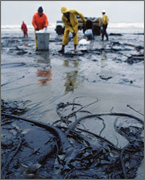National Oil Spill Preparedness and Response Regime
Overview
One of the most important programs that fall under the mandate of Environmental Response Systems is Canada's Marine Oil Spill Preparedness and Response Regime. Transport Canada is the lead federal regulatory agency responsible for the regime, which was established in 1995 and is built on a partnership between government and industry. Within the framework of the regime, Transport Canada sets the guidelines and regulatory structure for the preparedness and response to marine oil spills.
The guiding principles for the regime are:
- Effective and responsive legislation,
- Potential polluters pay for preparedness,
- Polluter pays for reasonable response costs,
- Based on partnership with industry,
- Comprehensive contingency plans,
- Mutual agreements with neighbours.
Transport Canada ensures that the appropriate level of preparedness is available to respond to marine oil pollution incidents in Canada of up to 10,000 tonnes within prescribed time standards and operating environments. The Regime is built on the principle of cascading resources, which means that in the event of a spill, the resources of a specific area can be supplemented with those from other regions (geographic areas) or from our international partners, as needed. For further details, select the links below.
